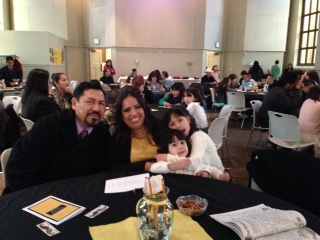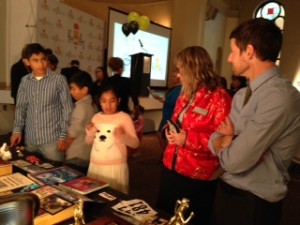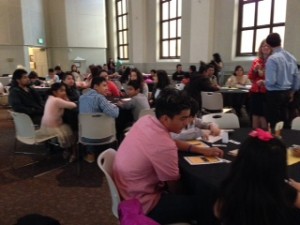MSU Denver celebrates Toyota Family Learning graduates
The first 60 participants in Metropolitan State University of Denver (MSU Denver)’s Toyota Family Learning program celebrated their joint accomplishments in the classroom, home and community during a ceremony on December 8 at St. Cajetan’s on the MSU campus.
“The Toyota Family Learning program showed me how to spend quality time with my children,” said graduate Concepcion Uriostegi, who participated in the program along with her daughters. “We now read together more often, talk more about what is happening at school, and do community service together. Those experiences are so valuable and are helping me pursue my dreams with my girls.”
 The Denver graduates all have Hispanic backgrounds and are English learners. Their Family Service Learning projects have focused on exercise and nutrition. They volunteered at a local urban gardening facility, The GrowHaus, to learn about growing food locally, as well as nutrition, cooking and other skills that drive healthy communities. They also volunteered at three local races, executing tasks such as race setup, registration, handing out water, cheering on runners, cleanup and medals disbursement.
The Denver graduates all have Hispanic backgrounds and are English learners. Their Family Service Learning projects have focused on exercise and nutrition. They volunteered at a local urban gardening facility, The GrowHaus, to learn about growing food locally, as well as nutrition, cooking and other skills that drive healthy communities. They also volunteered at three local races, executing tasks such as race setup, registration, handing out water, cheering on runners, cleanup and medals disbursement.
“Toyota Family Learning strengthens the family bond and enables parents and children to focus on learning and service activities,” said Sharon Darling, president and founder of NCFL. “Families learn they can make a difference in their own lives, as well as in their community.”
Graduation requirements of Toyota Family Learning include:
- Regular attendance in Parent Time and Parent and Child Together (PACT®) Time: Participants engaged in guided learning with a focus on leadership. During PACT Time, families learned together while engaging in activities including mentoring and service learning, using technology together, reading together and taking family trips.
- Family Service Learning activities: Reflecting Toyota Family Learning’s guiding philosophy, which is rooted in community, families participated in at least three service projects. [learn more about Family Service Learning]
- Family-to-family mentoring: Building community networks is integral to maintaining learning success post-graduation, and the mentoring element teaches families how to share learnings among one another during the program and beyond.
 Because of their participation in Toyota Family Learning, Coralia Rodriguez and Juan Reyes have improved their English skills, feel more confident in better supporting their children’s education, and have begun volunteering weekly at their children’s school. With a better grasp on English, they are able to help with homework, better communicate with their children’s teachers, and be better advocates for their daughters. They’re also engaging in regular community service with their 3- and 6-year-old daughters by assisting an elderly neighbor with his garden and helping prepare and sell food for fundraisers in their community.
Because of their participation in Toyota Family Learning, Coralia Rodriguez and Juan Reyes have improved their English skills, feel more confident in better supporting their children’s education, and have begun volunteering weekly at their children’s school. With a better grasp on English, they are able to help with homework, better communicate with their children’s teachers, and be better advocates for their daughters. They’re also engaging in regular community service with their 3- and 6-year-old daughters by assisting an elderly neighbor with his garden and helping prepare and sell food for fundraisers in their community.
“Support from Toyota Family Learning helps MSU Denver advance our mission of providing access to education,” said Stephen Jordan, president of MSU Denver. “We are grateful for this opportunity and look forward to creating a transformational experience for Toyota Family Learning families and the larger Denver
 “At Toyota, we want to be a good neighbor in our communities, a partner to help secure the foundation for a bright future,” said Michael Rouse, vice president, diversity, philanthropy and community affairs, Toyota.
“At Toyota, we want to be a good neighbor in our communities, a partner to help secure the foundation for a bright future,” said Michael Rouse, vice president, diversity, philanthropy and community affairs, Toyota.
“We are proud to be part of this innovative program that gives parents and children the skills and resources needed to be successful.”
MSU Denver launched Toyota Family Learning with a grant awarded by NCFL and Toyota for innovation in engaging families in learning together. The three-year, $175,000 grant is a part of the initiative’s pioneering movement to bridge the gap between the classroom, lifelong learning, and college and career readiness. The intergenerational program – geared toward vulnerable and low income families – focuses on parents and children learning alongside each other and from other families … as well as by serving their communities through instruction, Family Service Learning projects, mentoring and technology use.